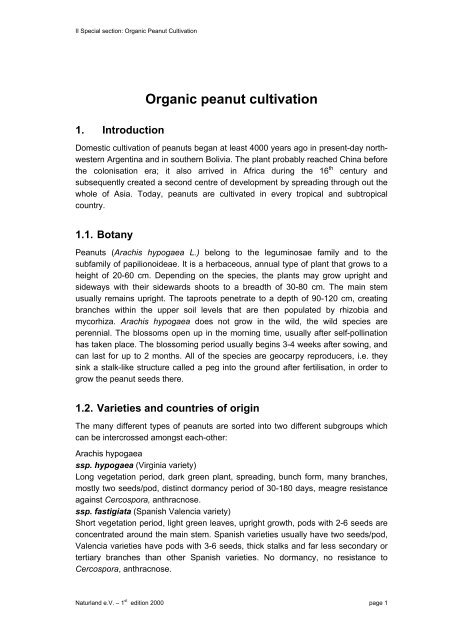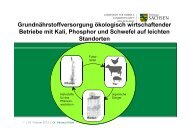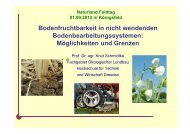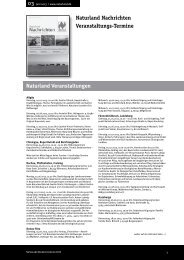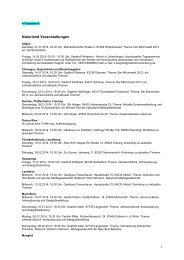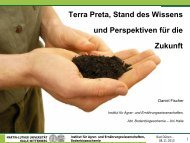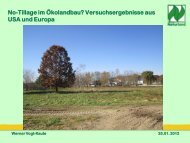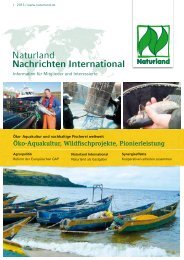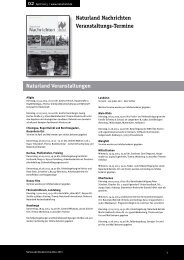Organic Farming in the Tropics and Subtropics: Peanuts - Naturland
Organic Farming in the Tropics and Subtropics: Peanuts - Naturland
Organic Farming in the Tropics and Subtropics: Peanuts - Naturland
You also want an ePaper? Increase the reach of your titles
YUMPU automatically turns print PDFs into web optimized ePapers that Google loves.
II Special section: <strong>Organic</strong> Peanut Cultivation<br />
1. Introduction<br />
<strong>Organic</strong> peanut cultivation<br />
Domestic cultivation of peanuts began at least 4000 years ago <strong>in</strong> present-day northwestern<br />
Argent<strong>in</strong>a <strong>and</strong> <strong>in</strong> sou<strong>the</strong>rn Bolivia. The plant probably reached Ch<strong>in</strong>a before<br />
<strong>the</strong> colonisation era; it also arrived <strong>in</strong> Africa dur<strong>in</strong>g <strong>the</strong> 16 th century <strong>and</strong><br />
subsequently created a second centre of development by spread<strong>in</strong>g through out <strong>the</strong><br />
whole of Asia. Today, peanuts are cultivated <strong>in</strong> every tropical <strong>and</strong> subtropical<br />
country.<br />
1.1. Botany<br />
<strong>Peanuts</strong> (Arachis hypogaea L.) belong to <strong>the</strong> legum<strong>in</strong>osae family <strong>and</strong> to <strong>the</strong><br />
subfamily of papilionoideae. It is a herbaceous, annual type of plant that grows to a<br />
height of 20-60 cm. Depend<strong>in</strong>g on <strong>the</strong> species, <strong>the</strong> plants may grow upright <strong>and</strong><br />
sideways with <strong>the</strong>ir sidewards shoots to a breadth of 30-80 cm. The ma<strong>in</strong> stem<br />
usually rema<strong>in</strong>s upright. The taproots penetrate to a depth of 90-120 cm, creat<strong>in</strong>g<br />
branches with<strong>in</strong> <strong>the</strong> upper soil levels that are <strong>the</strong>n populated by rhizobia <strong>and</strong><br />
mycorhiza. Arachis hypogaea does not grow <strong>in</strong> <strong>the</strong> wild, <strong>the</strong> wild species are<br />
perennial. The blossoms open up <strong>in</strong> <strong>the</strong> morn<strong>in</strong>g time, usually after self-poll<strong>in</strong>ation<br />
has taken place. The blossom<strong>in</strong>g period usually beg<strong>in</strong>s 3-4 weeks after sow<strong>in</strong>g, <strong>and</strong><br />
can last for up to 2 months. All of <strong>the</strong> species are geocarpy reproducers, i.e. <strong>the</strong>y<br />
s<strong>in</strong>k a stalk-like structure called a peg <strong>in</strong>to <strong>the</strong> ground after fertilisation, <strong>in</strong> order to<br />
grow <strong>the</strong> peanut seeds <strong>the</strong>re.<br />
1.2. Varieties <strong>and</strong> countries of orig<strong>in</strong><br />
The many different types of peanuts are sorted <strong>in</strong>to two different subgroups which<br />
can be <strong>in</strong>tercrossed amongst each-o<strong>the</strong>r:<br />
Arachis hypogaea<br />
ssp. hypogaea (Virg<strong>in</strong>ia variety)<br />
Long vegetation period, dark green plant, spread<strong>in</strong>g, bunch form, many branches,<br />
mostly two seeds/pod, dist<strong>in</strong>ct dormancy period of 30-180 days, meagre resistance<br />
aga<strong>in</strong>st Cercospora, anthracnose.<br />
ssp. fastigiata (Spanish Valencia variety)<br />
Short vegetation period, light green leaves, upright growth, pods with 2-6 seeds are<br />
concentrated around <strong>the</strong> ma<strong>in</strong> stem. Spanish varieties usually have two seeds/pod,<br />
Valencia varieties have pods with 3-6 seeds, thick stalks <strong>and</strong> far less secondary or<br />
tertiary branches than o<strong>the</strong>r Spanish varieties. No dormancy, no resistance to<br />
Cercospora, anthracnose.<br />
Naturl<strong>and</strong> e.V. – 1 st edition 2000 page 1


